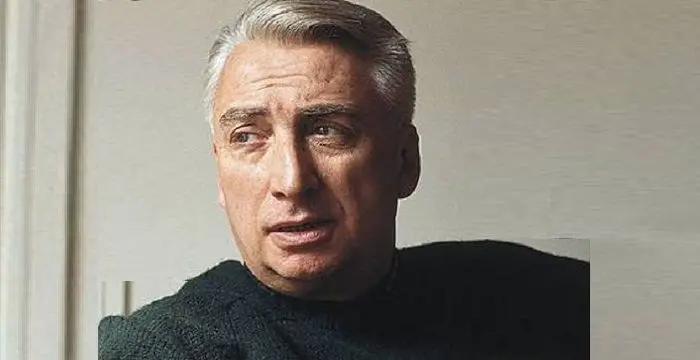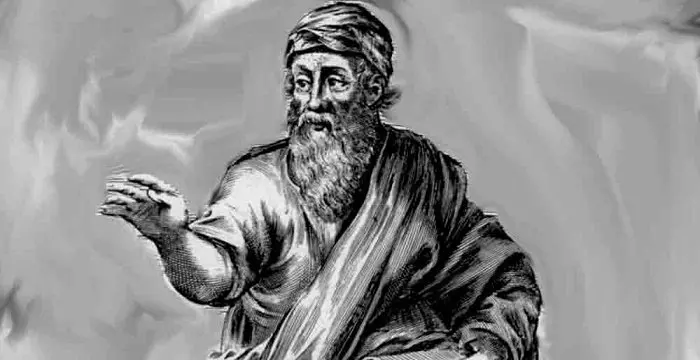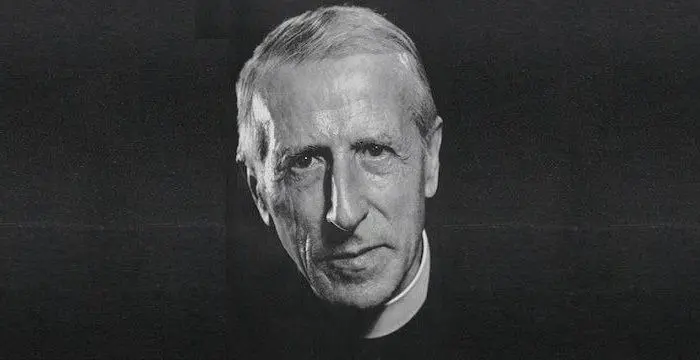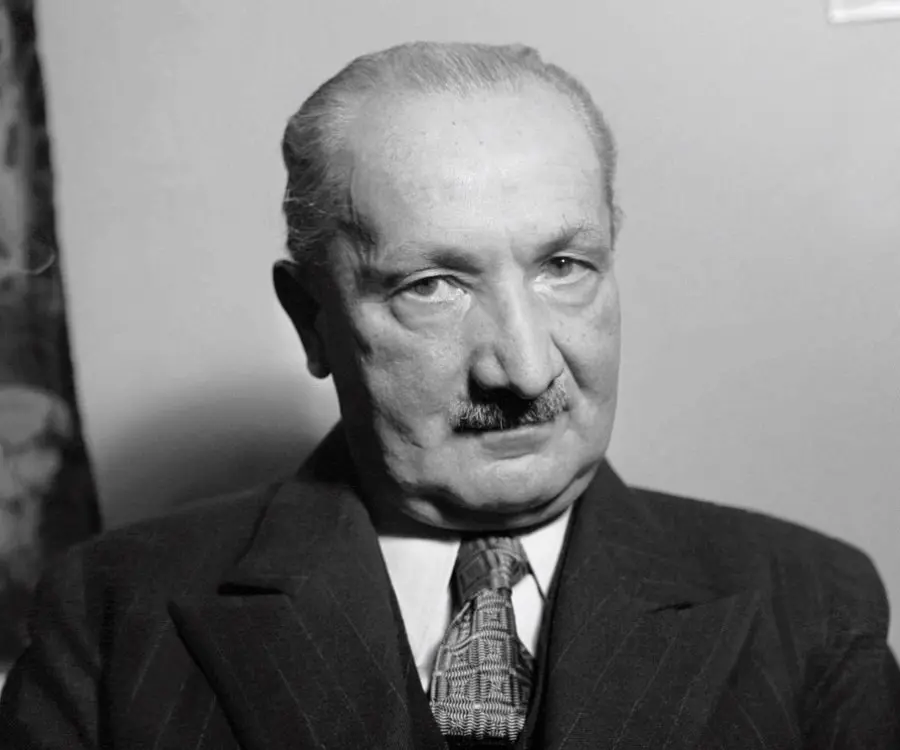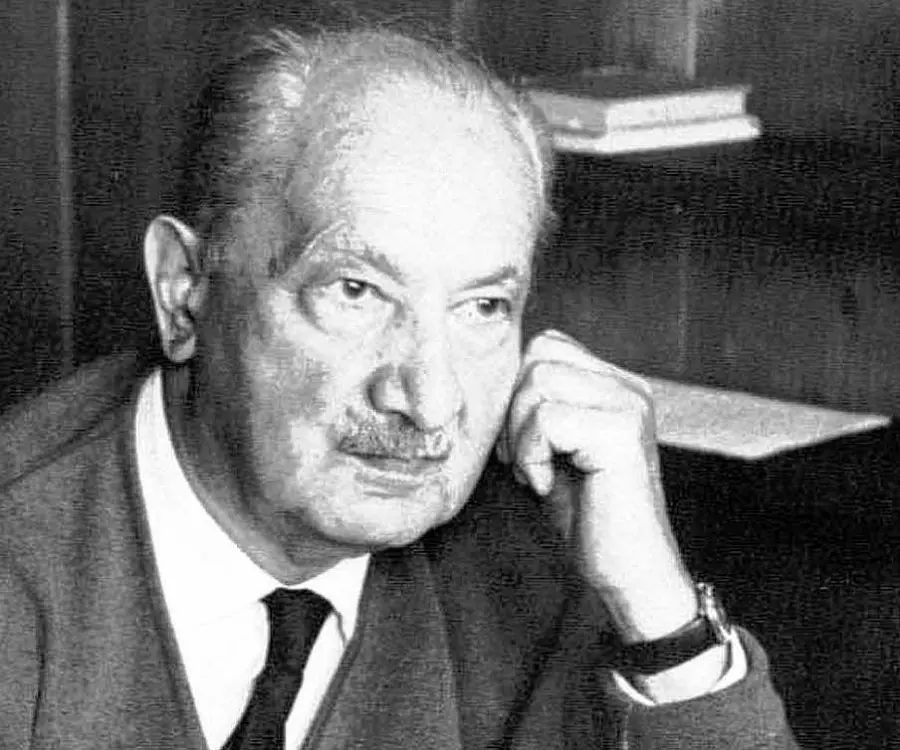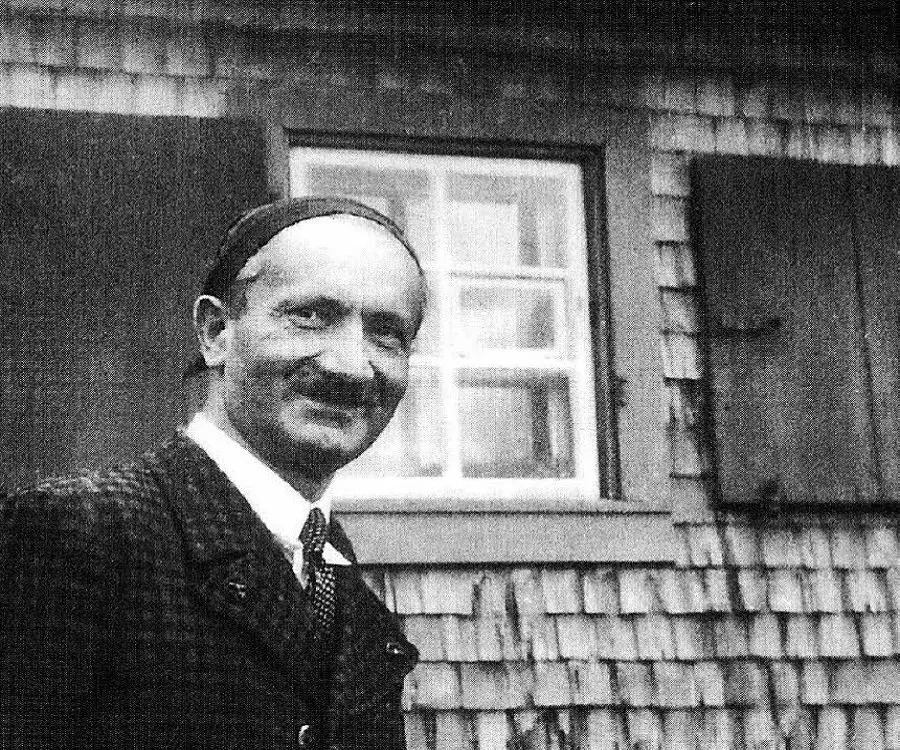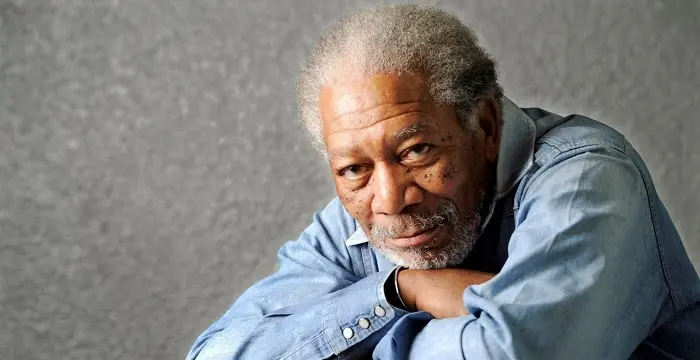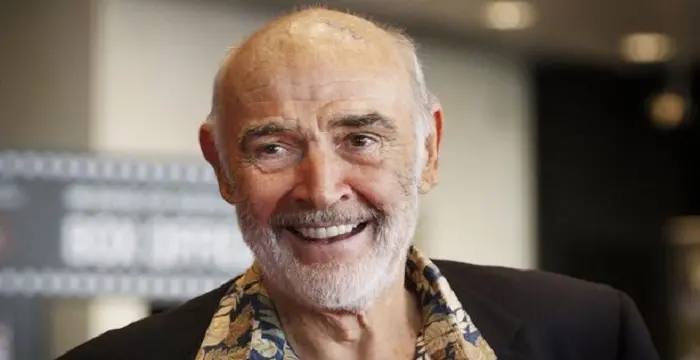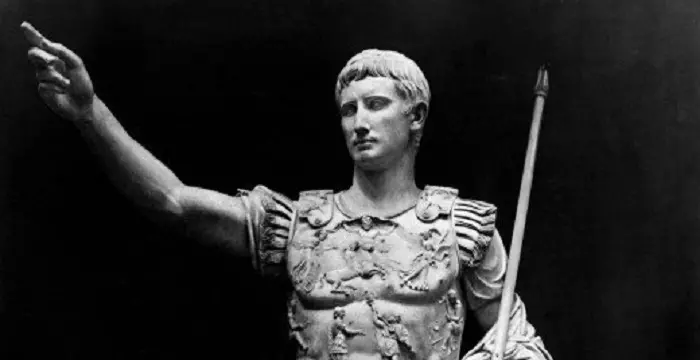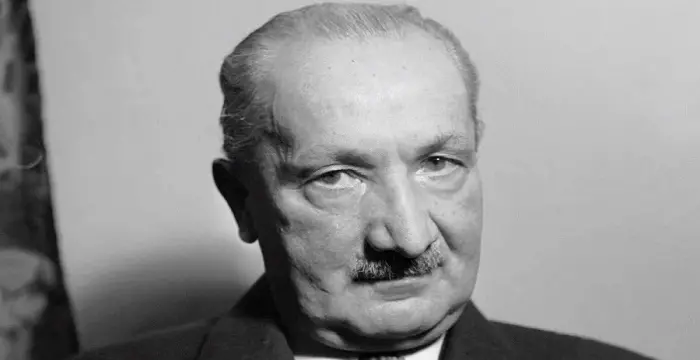
Martin Heidegger - Philosophers, Life Achievements and Childhood
Martin Heidegger's Personal Details
Martin Heidegger was a German philosopher, better known for his existential and phenomenological theories
| Information | Detail |
|---|---|
| Birthday | September 26, 1889 |
| Died on | May 26, 1976 |
| Nationality | German |
| Famous | Intellectuals & Academics, Philosophers, ISTJ, Philosophers |
| Spouses | Elfride Petri |
| Siblings | Fritz, Marie |
| Childrens | Hermann, Jörg |
| Universities |
|
| Birth Place | Meßkirch, Baden,, German Empire |
| Gender | Male |
| Father | Friedrich Heidegger |
| Mother | Johanna Heidegger |
| Sun Sign | Libra |
| Born in | Meßkirch, Baden,, German Empire |
| Famous as | German Philosopher |
| Died at Age | 86 |
// Famous Philosophers
Roland Barthes
Roland Barthes was a French literary theorist, critic and semiotician. This biography profiles his childhood, life, works, achievements and timeline.
Pythagoras
Pythagoras of Samos was a Greek mathematician and philosopher. Read on to learn more about Pythagoras’s profile, childhood, life and timeline.
Pierre Teilhard de Chardin
Pierre Teilhard de Chardin was a famous French philosopher and a priest who was also known for his controversial writings. Read more about the life and works of this philosopher in the following article.
Martin Heidegger's photo
Who is Martin Heidegger?
Martin Heidegger was a German philosopher, who is famous for his theories on existentialism and phenomenology. He was associated with existentialism, despite his efforts to stay away from it. His work had a crucial influence on the French existentialist Jean Paul Sartre. He gave the world a phenomenological critique of Kant and wrote widely on Nietzsche and Holderlin. His work did not just influence the literary world but made a substantial impact on fields such as philosophy, theology, art, architecture, artificial intelligence, cultural anthropology, design, literary theory, social theory, political theory, psychiatry, and psychotherapy. He wrote one of the most important works on philosophy of the 20th century, ‘Sein und Zeit (Being and Time)’. He published the book under pressure to meet the criteria for Husserl's chair at the University of Freiburg and the accomplishment of this work made his appointment to the post certain. He led a highly controversial life because of his association with the Nazi Party during World War II, an action he neither ever regretted nor apologized for in the public.
// Famous Philosophers
Martin Buber
One of the greatest philosophers to have ever walked on earth, Martin Buber contributions to philosophy is a long-standing one. Explore all about his profile, childhood, life and timeline here.
Lao Tzu (Laozi)
Lao Tzu was a legendary Chinese philosopher who wrote the important “Daodejing”. This biography profiles his childhood, life, career, achievements and timeline.
Alan Watts
Alan Watts was a famous British philosopher known for his Zen teachings and interpretations of Eastern philosophy. Read more about this great philosopher in the following article.
Childhood & Early Life
Martin Heidegger was born in Messkirch, Germany, to Friedrich Heidegger and Johanna Kempf. His father was the sexton of the village church, which is why Heidegger was brought up in a household of stringent religious beliefs.
Initially, his parents could not afford university education so he was enrolled at a Jesuit seminary but because of his psychosomatic heart condition, Heidegger was asked to leave the program.
From 1909 to 1911, Heidegger studied theology at the University of Freiburg and later changed his subjects to philosophy. By now he had left Catholicism because with his newly attained philosophical views, Catholicism did not make much sense.
He attained his doctoral degree after finishing his thesis on psychologism, inspired by Neo-Thomism and Neo-Kantianism and completed his venia legendi in 1916. He started working as Privatdozent and then as a German soldier during World War I.
Career
After working as a salaried assistant to Edmund Husserl at the University of Freiburg, Heidegger was honored with an extraordinary Professorship in Philosophy at the University of Marburg in 1923.
In 1927, Heidegger published his foremost work ‘Sein und Zeit (Being and Time)’ and became the Professor of Philosophy at the University of Freiburg in the following year, after Husserl retired.
In spite of its virtually tightly packed obscurity, the work earned Heidegger acknowledgment as one the world’s chief philosophers.
Heidegger's later works include: ‘Vom Wesen der Wahrheit (‘On the Essence of Truth’) 1930’, ‘Der Ursprung des Kunstwerkes (The Origin of the Work of Art) 1935’, ‘Einfuhrung in die Metaphysik (Introduction to Metaphysics (1935)’, Bauen Wohnen Denken (Building Dwelling Thinking) 1951’, etc.
He was made the rector of the University of Freiburg in 1933 and later joined the National Socialist German Workers’ (Nazi) Party. In his speeches and addresses, he started to openly support the German revolution and appreciate Adolf Hitler.
After the World War II ended, French authorities made sure that Heidegger is not allowed to teach because of his association with the Nazi Party in 1946. But he was later pronounced as a Mitlaufer and was not prosecuted.
This pronouncement allowed the University of Freiburg to hire him back and he was granted emeritus status in 1951 and continued to teach there for more than a decade, until 1967.
Major Works
‘Sein und Zeit (Being and Time)’, published in 1927, is Heidegger’s first academic book and is considered to be his most important work. The book investigates the question of ‘being’ through themes such as mortality, care, anxiety, temporality, and historicity.
Personal Life & Legacy
Heidegger got married to Elfride Petri in a Catholic ceremony and a week later in a Protestant ceremony in 1917. They had a son named Jorg together. He used to spend much of his time at his vacation home at Todtnauberg.
He died in 1976 and was buried in the Messkirch cemetery beside his parents and brother.
Trivia
He had extramarital affairs with Hannah Arendt and Elisabeth Blochmann, both were his students. Both the girls were Jewish and he helped Blochmann to flee from Germany prior to World War II, and restarted the association with both of them after the war.
In 1966, Heidegger was interviewed by Rudolf Augstein and Georg Wolff for ‘Der Spiegel magazine’, in which he agreed to talk about his political past provided that the interview is published posthumously.
In the interview, he defended his association with National Socialism in two ways - first, he said there was no option and it was eminent to save the university from being politicized. Secondly, he confessed that he saw an ‘awakening’ which he thought may help to find a ‘new national and social approach,’ but said that he changed his mind about this in 1934, mainly after being provoked by the brutality of the Night of the Long Knives.
Heidegger wanted to meet French writer Derrida in person after the latter sent him some of his work. There was discussion of a meeting in 1972, but it did not take place.
Lucien Braun introduced to Heidegger the work of Michel Foucault. Foucault’s association to Heidegger is a subject of substantial complexity - Foucault recognized Heidegger as a philosopher whom he read but never wrote about.
// Famous Intellectuals & Academics
Bertil Gotthard Ohlin
Bertil Gotthard Ohlin was a famous Swedish economist. This biography profiles his childhood, family life & achievements.
Emily Greene Balch
Emily Greene Balch was an American economist, sociologist and pacifist who won the 1946 Nobel Peace Prize. This biography of Emily Greene Balch provides detailed information about her childhood, life, achievements, works & timeline.
Martin Buber
One of the greatest philosophers to have ever walked on earth, Martin Buber contributions to philosophy is a long-standing one. Explore all about his profile, childhood, life and timeline here.
Martin Heidegger biography timelines
- // 26th Sep 1889Martin Heidegger was born in Messkirch, Germany, to Friedrich Heidegger and Johanna Kempf. His father was the sexton of the village church, which is why Heidegger was brought up in a household of stringent religious beliefs.
- // 1909 To 1911From 1909 to 1911, Heidegger studied theology at the University of Freiburg and later changed his subjects to philosophy. By now he had left Catholicism because with his newly attained philosophical views, Catholicism did not make much sense.
- // 1916He attained his doctoral degree after finishing his thesis on psychologism, inspired by Neo-Thomism and Neo-Kantianism and completed his venia legendi in 1916. He started working as Privatdozent and then as a German soldier during World War I.
- // 1917Heidegger got married to Elfride Petri in a Catholic ceremony and a week later in a Protestant ceremony in 1917. They had a son named Jorg together. He used to spend much of his time at his vacation home at Todtnauberg.
- // 1923After working as a salaried assistant to Edmund Husserl at the University of Freiburg, Heidegger was honored with an extraordinary Professorship in Philosophy at the University of Marburg in 1923.
- // 1927In 1927, Heidegger published his foremost work ‘Sein und Zeit (Being and Time)’ and became the Professor of Philosophy at the University of Freiburg in the following year, after Husserl retired.
- // 1927‘Sein und Zeit (Being and Time)’, published in 1927, is Heidegger’s first academic book and is considered to be his most important work. The book investigates the question of ‘being’ through themes such as mortality, care, anxiety, temporality, and historicity.
- // 1930Heidegger's later works include: ‘Vom Wesen der Wahrheit (‘On the Essence of Truth’) 1930’, ‘Der Ursprung des Kunstwerkes (The Origin of the Work of Art) 1935’, ‘Einfuhrung in die Metaphysik (Introduction to Metaphysics (1935)’, Bauen Wohnen Denken (Building Dwelling Thinking) 1951’, etc.
- // 1933He was made the rector of the University of Freiburg in 1933 and later joined the National Socialist German Workers’ (Nazi) Party. In his speeches and addresses, he started to openly support the German revolution and appreciate Adolf Hitler.
- // 1946After the World War II ended, French authorities made sure that Heidegger is not allowed to teach because of his association with the Nazi Party in 1946. But he was later pronounced as a Mitlaufer and was not prosecuted.
- // 1966In 1966, Heidegger was interviewed by Rudolf Augstein and Georg Wolff for ‘Der Spiegel magazine’, in which he agreed to talk about his political past provided that the interview is published posthumously.
- // 1967This pronouncement allowed the University of Freiburg to hire him back and he was granted emeritus status in 1951 and continued to teach there for more than a decade, until 1967.
- // 1972Heidegger wanted to meet French writer Derrida in person after the latter sent him some of his work. There was discussion of a meeting in 1972, but it did not take place.
- // 26th May 1976He died in 1976 and was buried in the Messkirch cemetery beside his parents and brother.
// Famous ISTJ
Morgan Freeman
Morgan Freeman is an Academy Award winning actor known for his work in movies like ‘Street Smart’, ‘Driving Miss Daisy’ and ‘Million Dollar Baby’. This biography provides detailed information about his childhood, life, achievements, works & timeline.
Sean Connery
Sean Connery is a Scottish actor, best known for portraying the iconic role of the spy, ‘James Bond’ in movies. This biography of Sean Connery provides detailed information about his childhood, life, achievements, works & timeline.
Natalie Portman
Natalie Portman is an acclaimed and award winning actress, producer and director. This biography offers detailed information about her childhood, career, work, life, achievements and timeline.
Robert De Niro
Robert De Niro is a legendary actor of Hollywood who has given some iconic movies. To get details about his childhood, life, career and timeline, read this biography.
Matt Damon
Matt Damon is an actor-screenwriter who received the Best Original Screenplay ‘Academy Award’ for the movie Good Will Hunting. To know more about his childhood, profile, career and timeline read on.
Augustus
Augustus was the founder of the Roman Empire and its first Emperor. This biography of Augustus provides detailed information about his childhood, life, achievements, works & timeline
Martin Heidegger's FAQ
What is Martin Heidegger birthday?
Martin Heidegger was born at 1889-09-26
When was Martin Heidegger died?
Martin Heidegger was died at 1976-05-26
Where was Martin Heidegger died?
Martin Heidegger was died in Freiburg im Breisgau, Baden-Württemberg,, West Germany
Which age was Martin Heidegger died?
Martin Heidegger was died at age 86
Where is Martin Heidegger's birth place?
Martin Heidegger was born in Meßkirch, Baden,, German Empire
What is Martin Heidegger nationalities?
Martin Heidegger's nationalities is German
Who is Martin Heidegger spouses?
Martin Heidegger's spouses is Elfride Petri
Who is Martin Heidegger siblings?
Martin Heidegger's siblings is Fritz, Marie
Who is Martin Heidegger childrens?
Martin Heidegger's childrens is Hermann, Jörg
What was Martin Heidegger universities?
Martin Heidegger studied at Albert Ludwigs University of Freiburg (1909–1913), Bertholds gymnasium (1906–1909)
Who is Martin Heidegger's father?
Martin Heidegger's father is Friedrich Heidegger
Who is Martin Heidegger's mother?
Martin Heidegger's mother is Johanna Heidegger
What is Martin Heidegger's sun sign?
Martin Heidegger is Libra
How famous is Martin Heidegger?
Martin Heidegger is famouse as German Philosopher
